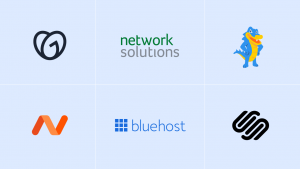Key takeaways:
- Domain names aren’t automatically intellectual property, but they can be protected under trademark law if they’re unique, used in business, and tied to a brand.
- Trademarks and domain names serve different purposes, but conflicts happen when domains cause confusion, mimic a brand, or are registered in bad faith.
- Treat your domain as a valuable digital asset, protect it legally, and manage it as part of your brand’s long-term strategy.
Ever wondered if your domain name counts as intellectual property? It’s a smart question to ask especially as domain names become more valuable to businesses and personal brands alike.
A domain name can help people find you and remember you. And with that kind of value, it’s worth understanding how domain names work from a legal perspective.
In this guide, we’ll walk you through the basics of intellectual property, how it applies to domain names, and what you can do to protect your brand online. We’ll keep it clear and practical every step of the way.
What are domain names and why do they matter?
A domain name is the web address people type into their browser to visit your site. It’s your spot on the internet, and often the first thing someone sees when they come across your brand online.
It’s kind of like a digital street address. Instead of giving people a string of numbers (your website’s IP address), you give them a name that’s easy to remember, type, and share.
A domain name might seem like a small detail, but it plays a huge role in how others see and find your brand online. Here’s why:
- They define your online identity. A good domain name can help people instantly recognize who you are and what you do.
- They boost trust and credibility. A clean, professional domain makes your business look more legit. This is great if you’re selling something or offering a service.
- They impact your visibility. A memorable domain can make it easier for people to find you online, especially if it matches your brand name.
- They’re digital assets. Some domain names are so valuable they get bought, sold, or leased like real estate.
Learn more about what domain names are and how they work in our full article.
What is intellectual property?
Intellectual property (IP) refers to things people create with their minds. That includes designs, logos, inventions, business names, written content, software, and more. These creations have value, and IP laws are meant to protect the people or businesses who came up with them.
There are four main types of intellectual property:
- Trademarks
- Copyrights
- Patents
- Trade secrets
Trademarks
Trademarks protect brand identifiers like names, slogans, logos, or symbols, that help people recognize where a product or service is coming from. For example, the Nike swoosh or the word “Google” are both trademarks.
Trademarks can be either registered or unregistered. A registered trademark is officially recorded with a government office and offers strong legal protection. In contrast, an unregistered trademark can still provide limited protection under common law, especially if it’s actively used in business.
Copyrights
Copyrights apply to original works like books, songs, videos, images, and even software. The moment something original is created and put into a tangible form (like writing it down or recording it), it’s typically covered by copyright.
In most cases, copyright protection lasts for the creator’s lifetime plus 70 years. However, if a company owns the work, the protection usually lasts 95 years from publication or 120 years from creation, whichever is shorter.
Patents
Patents protect inventions. This can include physical products, machines, software processes, or scientific formulas. A patent gives the inventor exclusive rights to make, use, or sell the invention for a limited time, usually 20 years.
To get a patent, the invention must be new, useful, and not obvious to others in the field. In exchange for protection, the inventor publicly discloses how the invention works.
Trade secrets
Trade secrets are confidential business strategies or methods that give a company a competitive edge. Like secret recipes, manufacturing processes, or internal algorithms. Trade secrets aren’t registered with the government. Their protection depends on how well the company keeps the information private.
Are domain names considered intellectual property?
To answer this, it helps to consider domain names from legal, business, and technical perspectives. While domain names can be valuable and sometimes protected, they don’t always fit neatly into the traditional categories of intellectual property like patents, trademarks, or copyrights.
Legal perspective
From a legal standpoint, domain names aren’t automatically considered intellectual property because they don’t represent a form of creativity, invention, or branding in the same way that a patent or trademark does.
You might have come up with a new domain name or consider it as a name for your business. But a domain itself isn’t like a patent for a new invention or a trademark for a company logo. It doesn’t represent any tangible expression of something you can touch or see.
Business perspective
From a business perspective, domain names are important assets but they’re not an intellectual property. Companies often invest heavily in domains because they represent their online identity and can be critical to their branding efforts, but this does not elevate domain names to the status of IP.
Technical perspective
Technically, domain names aren’t intellectual property because they function primarily as addresses to help computers and users locate resources on the Internet. They’re usually linked to certain IP addresses.
Just like you use a phone number to find someone in a phonebook, you use a domain name in your browser to find a web page instead of remembering a long list of IP addresses.
When can domain names be treated as intellectual property?
In general, domain names aren’t automatically considered intellectual property. However, they can be treated as IP when they gain value through use—particularly when they’re tied to branding, commerce, or legal protection.
For example:
- A startup builds a strong brand around its domain and trademarks it.
- A high-traffic domain becomes a valuable digital asset and is bought or sold for a profit.
- A business defends its domain name in a legal dispute using trademark law.
In cases like these, the domain name becomes part of the company’s intellectual property portfolio, even if it didn’t start that way. The key factor is how the domain is used, not just its name or registration status.
Domain names vs. trademarks
Domain names and trademarks often get lumped together. Both help identify a business or brand, but they work in different ways and have different types of protection.
Domain names are website addresses you register so people can find your site online, while trademarks are legally protected names, logos, or symbols that help people recognize your product or service in the marketplace.
A domain name alone isn’t automatically a trademark, but it can become one if used actively to represent your brand.
Common trademark issues with domain names
Trademark issues with domain names mostly revolve around the potential for confusion among customers and bad-faith intent of those registering domain names that include someone else’s trademark. The most common types of issues include:
- Likelihood of confusion. If a domain name is too similar to a trademark, it can mislead customers. People might think the domain is linked to the real brand even if it’s not.
- Cybersquatting. This happens when someone registers a domain that matches someone else’s trademark, hoping to sell it later for a profit. In many cases, this is considered bad faith and can lead to legal action.
- Trademark dilution. Even if there’s no confusion, using a famous trademark in your domain can weaken that brand’s distinctiveness.
- Bad faith registration or use. A domain might be flagged for bad faith if it’s used to mislead users, redirect traffic to a competitor, or demand money from the trademark holder.
- Typo squatting. This involves registering misspelled versions of popular domains to catch traffic from people who type URLs wrong. It’s deceptive and often illegal.
- Domain parking. Some people register domains and fill them with ads, hoping to profit off traffic intended for another brand.
How these disputes get resolved
There are several ways these disputes can be settled. Often, the goal is to find a fair solution without going to court. Here’s how these disputes are usually handled:
- UDRP complaints. The Uniform Domain-Name Dispute-Resolution Policy (UDRP) lets trademark owners file a complaint through ICANN if they believe a domain is infringing on their trademark.
- Legal action. Some cases go to court, especially under laws like the U.S. Anti-Cybersquatting Consumer Protection Act (ACPA). A court can cancel or transfer the domain and award damages in some cases.
- Negotiation or domain acquisition. In some cases, businesses simply offer to buy the domain from the current owner to avoid a long dispute.
Can you trademark a domain name?
You can’t automatically trademark a domain name just because you registered it. However, under the right conditions, a domain name can qualify for trademark protection.
To be eligible, the domain needs to meet a few key requirements:
- It’s used in business. The domain must point to a real product, service, or business and not just a parked page or empty site.
- It clearly identifies your brand. Your domain should stand out and help customers associate it with your company. Generic names are harder to trademark unless they’ve built up strong brand recognition over time.
- It doesn’t conflict with existing trademarks. If your domain is too close to a name that’s already trademarked, you could face legal issues instead of protection.
How to trademark a domain name
If your domain name meets the key requirement for trademark protection, the next step is to apply for a trademark. The process typically involves several important steps:
- Do a trademark search. Check if the domain name (or anything similar) is already registered as a trademark. You can use the USPTO search tool or hire a professional to do this for you.
- Prove it’s used in commerce. You’ll need to show that the domain is part of a real business like a store, service page, or platform actively selling something.
- File an application. In the U.S., you can apply through the United States Patent and Trademark Office (USPTO). You’ll need to describe how you’re using the domain name and submit examples (like a screenshot of your homepage).
- Maintain the trademark. Once approved, you’ll need to keep using the domain name and file updates to maintain the trademark over time.
Trademarking your domain name helps protect your brand and gives you stronger legal rights if someone tries to use a confusingly similar name. If you’re unsure about any step, it’s a good idea to work with a trademark attorney who can guide you through the process smoothly.
How different countries treat domain names as IP
Laws about domain names and intellectual property aren’t the same everywhere. While some countries treat domain names as business assets with strong legal protection, others are still catching up when it comes to enforcement.
Here’s a quick look at how different parts of the world handle domain names and their connection to IP:
United States
In the U.S., domain names are not considered intellectual property by default. But they can be protected under trademark law, if they’re actively used to promote a business or brand. If a domain is used in commerce and clearly represents a business or product, it may be eligible for trademark registration.
The Anti-Cybersquatting Consumer Protection Act (ACPA) also allows businesses to take legal action against individuals who register domain names in bad faith, especially if they’re similar to existing trademarks.
European Union (EU)
The EU offers similar protections to the U.S., with an emphasis on trademark rights and fair competition. The EU Intellectual Property Office (EUIPO) handles trademark registration and disputes at the EU level. If your domain name is linked to a registered trademark and used in a way that identifies your brand, it can be enforced as part of your IP rights.
Country-specific domain rules (like .de for Germany or .fr for France) may come with extra conditions or restrictions set by national authorities. So, while EU-wide protections apply, local regulations may affect domain ownership or usage.
Asia and other regions
Laws vary widely across countries in Asia, Africa, and Latin America. Some countries have modern IP frameworks, while others are still developing systems to handle domain-related disputes.
In Japan, domain names are well protected, and disputes are handled through a local version of the UDRP. China has made efforts to crack down on cybersquatting, though enforcement can be inconsistent. In India, domains are treated as intangible property, and many disputes are still handled outside of court through arbitration panels.
Other regions may rely on international frameworks like the UDRP or are working toward more structured systems.
What this means for you
Because laws vary across regions, it’s important to know the rules in the country where you do business or register your domain. Registering your domain name under multiple country-specific extensions (like .com.au or .co.uk) can help protect your brand across borders. And if you run into issues abroad, such as domain disputes or misuse, you can turn to international resolution processes like the UDRP to help resolve them.
Taking these steps gives your domain stronger protection as part of your overall intellectual property strategy.
Treat your domain like the asset it is
Domain names might not automatically count as intellectual property, but they can still be incredibly valuable. When used for business, a good domain builds trust and becomes a core part of your brand identity.
In some cases, it can even qualify for legal protection if it’s unique and actively tied to your business name, products, or services.
If you’re preparing to launch a website or build your brand, treat your domain like a long-term investment. And when you’re ready, start your domain search with Network Solutions. We make it easy to search for and secure a domain that fits your business and supports your growth.
Frequently asked questions
Yes. If your domain closely matches a registered trademark or service mark, and it’s causing confusion, you could lose the rights to that particular domain name especially if it was registered in bad faith.
Yes, domain names are generally considered a form of digital property. Some valuable domain names have even been sold for millions. Like any asset, you can sell, transfer, or lease them depending on their market value.
The legal owner is the registrant listed during the domain name registration process. Make sure your name or business is on record when you register domain names, especially if someone else sets it up for you.
Not by default. A domain or URL doesn’t automatically qualify as a trademark or service mark. But if it’s distinctive and tied to a brand, it may be protected under trademark law.
The domain name system connects generic top-level domains (like .com, .net) and other TLDs to specific IP addresses. It’s what makes it possible for users to visit websites using human-friendly names instead of numbers.




